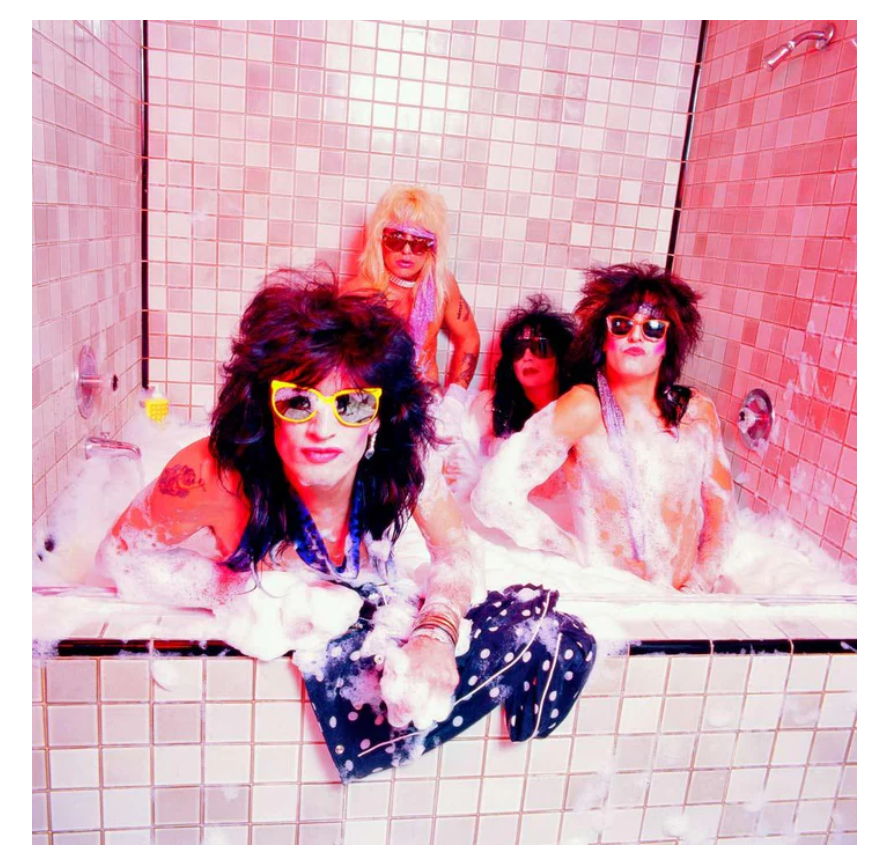Motley Crüe on Mental Health: Teens Today Face a Different World
I’m a bit of a relic, so I still tune into AM/FM radio when I'm in my car. Yesterday, as I was driving, I caught part of a classic rock station (a big thanks to WMGK in Philadelphia!) and suddenly “Girls, Girls, Girls" blasted from the speakers. It’s one of those tracks by Motley Crüe. As soon as I heard it, I started thinking back to the music video—and how far removed it is from what we consider acceptable these days. For those who might not recall, the video features an entirely indulgent and sexist portrayal centered around their experiences at strip clubs across different countries.
Instant time warp. For a minute, I was back in the late 80s, windows down, hair big, problems small. And honestly? It just felt fun . That's when I realized.

Life used to feel… lighter. Being a teen back then was messy, sure, but it was analog mess. You could screw up and it didn’t follow you home on your phone. You could be awkward and it didn’t end up on TikTok. There were bullies, but they weren’t in your bedroom via group chats at 11 PM.
Back then, you had your Walkman, a handful of friends who knew everything about you, and your biggest worry might have been whether someone was going to ask you to the dance.
But what about now? When I observe my teenage son, I genuinely feel that being a child isn't as enjoyable these days. I constantly pose open-ended questions to him, and he says everything is okay. However, his experience is his truth—he has no idea that life can be easier, happier, and simply more joyful.
I asked him if he's content, and he always replies with "yes." Yet I find myself questioning—do modern teenagers and young adults truly understand what real, genuine adolescent enjoyment means?
This generation bears a burden we never had. Their worry runs deeper. The pressures they face are greater. All things seem more intense, quicker, harsher. There's less space for simply... be 1. To create chaos. To move at your own pace.

We're bringing up children in an era where everything seems pressing, carefully selected, and continuously judged by educators, classmates, and even unknown people on the internet. When you add challenges like learning difficulties or issues with mental well-being, school can turn into the most stressful part of their day. That one spot which should provide assistance, yet frequently fails to do so.
Today's teenagers find themselves trapped in a high-stress environment. The influence of social media. Excessive testing. An educational system recovering from the pandemic that has yet to fully address the needs of every student. And, as if that weren't enough, they're navigating these challenges at a time when their minds are still maturing and adolescence is in full force. It's hardly surprising that levels of anxiety and reluctance to attend school are rising sharply.
What about us parents? We're simply striving to stay ahead of things. We want to provide for our children's needs without becoming known as "that parent." We aim to shield them from a world we ourselves weren't raised in, and which we often find hard to grasp. Yet, at the same time, we are the ones responsible—the ones who contributed to shaping this situation.
Many teenagers nowadays carry an underlying sense of weight. It isn’t exaggerated or overly emotional like the "door slamming and loud music" style we used to associate with angst—rather, it’s a constant, mild sorrow that stays with them. They appear gloomy, not due to being idle or unappreciative, but because they’re tired - Fed up with constantly being "available." Exhausted from feeling inadequate—in social situations, schoolwork, and emotional well-being. Let's face it, we're exhausted as well. It's tough seeing your child shrink themselves just to get through the day. - Done with the constant pressure of being "on." Tired of experiencing a sense of failure—whether socially, academically, or emotionally. To be fair, we feel the same way. Watching our child suppress their true self simply to make it through each day is heartbreaking. - Overwhelmed by the never-ending demand to stay "connected." Feeling like you aren’t measuring up—socially, educationally, mentally. Honestly, we share that exhaustion. It's painful to see your child hide who they truly are just to cope with daily life. - Sick of staying "in the spotlight" all the time. Frustrated with the belief that you're not good enough—at school, in relationships, within yourself. We understand this struggle too. Seeing your child lose their light just for survival breaks our hearts.
You inquire about their day and receive a shrug. You attempt conversation and only hear single-syllable responses. It's simple to dismiss this as standard teenage conduct, yet there seems to be an aspect distinct to this group. It isn't merely due to hormonal changes or emotional fluctuations—it appears they bear unseen burdens that aren't immediately visible. When you truly consider all they're dealing with… perhaps it becomes clear why hope sometimes seems more distant for them.
So whom should we hold responsible for this atmosphere? Truly… everyone. The adults. Society. Institutions. Choose whichever you like. At some point, we allowed perfectionism to take over as a way of raising children and made productivity the standard of value. We transformed each achievement into a number, every hobby into something that boosts a resume. We gave them smartphones before they developed confidence in themselves. We permitted schools to transform into high-pressure environments and labeled it "academic excellence." And we accepted the false belief that anxiety is simply an unavoidable part of adolescence these days.
We never intended to. Many of us are simply striving to provide our children with better opportunities than we received. Yet, in this effort, we have given them... less what truly counts—free time, space for mistakes, the freedom to simply... be We exchanged liberty for anxiety. Innovation for obedience. Self-assurance for hesitation. And now, we see a generation of children growing up scared to speak up, scared to be different, scared to fail. And this is a tough truth to acknowledge.
I can't wrap this up with a tidy ribbon. There's no "5 easy steps" or straightforward request.
Only this: if you're a Generation X parent who feels a bit sad because your child isn't experiencing the same independence and enjoyment as you did—rest assured, you aren't alone.
If your teen appears withdrawn, tired, or as though they’re burdened with something big, chances are they really are. Offer them a gentle space to come back to. Be their safe haven—like the year 1987—even if only for brief moments during dinner or a drive in the car.
Motley Crüe wasn't only about playing music; they... oozed Confidence. The bold, perspiring, midair-middle-finger type of self-assurance. They weren't aiming to impress anybody. They didn't mind being overly loud, excessively wild, or simply too much. That period embraced defiance, uniqueness, and absolutely refusing to worry about others' opinions. It was disorganized, untidy, yet somehow genuinely liberating.
Our children don't have that advantage. They're under constant scrutiny—with algorithms, with GPA scores, with the unyielding gaze of social media. There's no space for "overdoing" or "working things out." They're supposed to excel, manage themselves, act properly, fit in. Be confident without being confrontational. Stand out, yet remain within bounds. weird They navigate a precarious line that we were never required to maintain. The outcome? They are drained. We observe this through their nervousness, lack of self-belief, and reluctance to attend school. They are coming of age in an environment where confidence is not only uncommon—it's nearly defiant.
Perhaps that's why listening to Motley Crüe had such an impact on me. It brought back memories of a period when we were permitted to occupy our own space. When it was acceptable— cool even—being a bit noisy, a bit confused, yet believing you could take over the world.
We cannot reverse time. However, perhaps, just possibly, we can help ease their burden a bit today.
----------------------
Also from Lisa Lightner :
- 25 Activities That Assist Adolescents in Acquiring and Enhancing Social Abilities
- What are Social Awareness Skills ?
- What is Social Emotional Learning A Handbook for Guardians
- The Effect of Social Interaction in the Modern Era (video): FaceTime vs. In-Person Interaction with Dr. Stephanie Fields
- How and What for Building Social Capital for your Disabled Child.
- Social Emotional Learning Activities for Junior High and Senior High students
- Fun Icebreaker Games for Teens that really work!
- Teenager Lacking Social Skills ? Try these ideas.

Posting Komentar untuk "Motley Crüe on Mental Health: Teens Today Face a Different World"
Please Leave a wise comment, Thank you